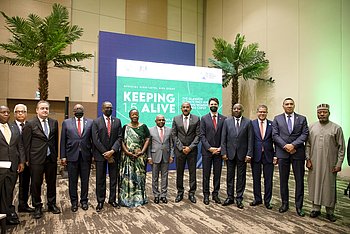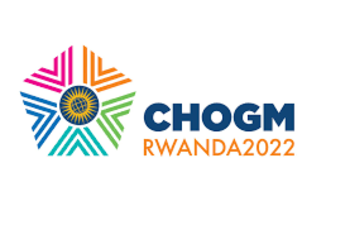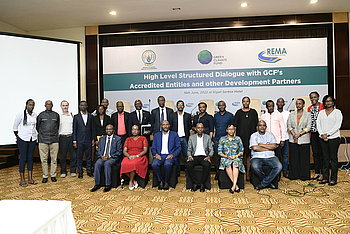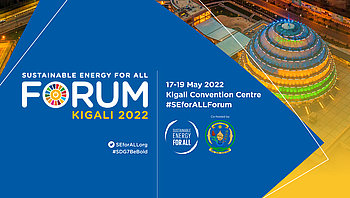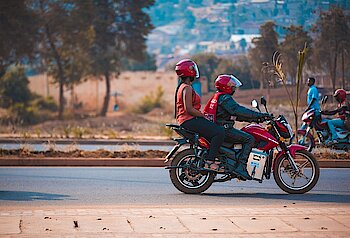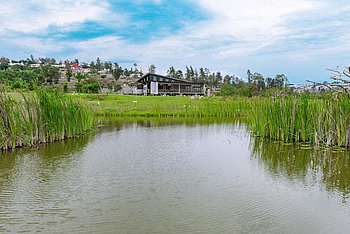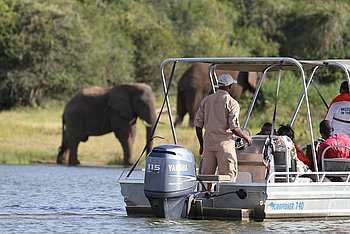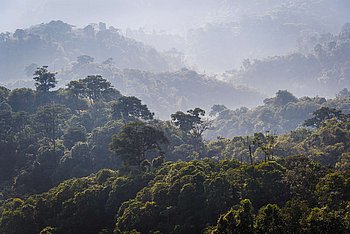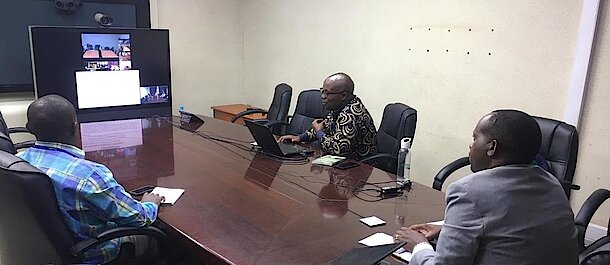
Assessment of Rwanda’s vulnerability to climate change was presented to local authorities
Rwanda Environment Management Authority (REMA), with the logistical support of Ministry of Local Government (MINALOC), hold a video conference with Province and District representatives from all over the country on 17th March 2020 to present the findings of the latest assessment of climate change vulnerability and discuss proper measure to implement the recommendations to reduce vulnerability to climate change.
Global changes in temperature and precipitation and the regional distribution of those changes are the primary drivers affecting climate-related natural hazards such as floods, landslides and droughts that stroke Rwanda in recent years with a devastating effect on the population. From the livelihoods of rural populations to food security in urban areas, the core gateway transport, communication, energy, health, water control, and institutional systems upon which populations depended failed during some cases.
The capacity and scale of adaptation to climate change depends on the vulnerability of people and natural systems to the impacts, where vulnerability is the susceptibility shaped by exposure, sensitivity and resilience.
The report presented to local authorities provides an examination at the country’s vulnerability by taking a detailed look at climate change vulnerability in the country’s 30 districts focusing on households using various indicators of household vulnerability. This report also updates REMA’s national level vulnerability assessment, first prepared in 2015, using a broad range of indicators of vulnerability that were selected during the preparation of the first assessment.
Using indicators of exposure and sensitivity to climate change as well as adaptive capacity, this report provides a comprehensive data-driven picture of climate change vulnerability facing Rwanda. Data was collected through a survey of 2,407 households in all districts of the country; data has been analyzed and presented at the district and provincial levels.
This assessment provides an understanding of the relative vulnerability to climate change of the four provinces, the City of Kigali and 30 districts based on a vulnerability index. The climate change vulnerability index uses numbers to assess jurisdictions, which have then been categorized as Low, Medium and High vulnerability.
Local authorities were urged to the report’s recommendations in detail and make commitments to take action and renew their commitments to fight the effects of climate change. Districts were encouraged to press ahead with the implementation of the ‘green economy’ plans within their District Development Strategies (DDS). Where possible districts should review their development strategies and planned projects and ensure their plans are informed by this report’s assessment of their climate vulnerabilities, and by future climate scenario.
The report also include an assessment of vulnerability at sectoral level whereby the report reviews new data collected using the National Framework for Vulnerability Assessment established in 2015 with 37 indicators of vulnerability. It analyses the changes that have taken place since data was first gathered in 2015.
The analysis reveals that increases or improvements in adaptive capacity are helping to reduce the vulnerability of the country in the face of climate change. However these improvements have been offset to some extent by increases in the impact of climate change. Recommendations are provided aimed at targeted action to reduce the sensitivity of the country to climate change factors and to build the adaptive capacity in order to reduce vulnerability and improve the level of resilience.
Topics
More posts
COMMONWEALTH LEADERS MEET IN KIGALI TO DISCUSS WAYS OF KEEPING THE 1.5-DEGREE GOAL ALIVE
The Governments of Rwanda and the United Kingdom together with the Presidency of the United Nations Climate Change Conference (COP26) have on 23rd Jun…
Climate change as key issue that are of special in the CHOGM – 2022 discussion
The effects of climate change are being felt throughout the Commonwealth, with some Member States experiencing climate change impacts, which is a…
Public and Private sectors, Green Climate Fund accredited entities and development partners joined in the structured dialogue
On 16 June 2022 at Kigali Serena Hotel, the public, private sectors, Green Climate Fund (GCF) accredited entities and development partners have joined…
REMA AND HIGHER LEARNING INSTITUTIONS AGREED TO ENHANCE PARTNERSHIP IN ENVIRONMENT AND CLIMATE CHANGE RESEARCH
As part of the “World Environment Day Celebrations”, Rwanda is holding its annual National Environment Week. The week begun on Saturday 28 May by the…
Global Leaders Convening Tomorrow at the SEFORALL Forum in Kigali for Landmark Event on Energy and Climate
At a time when far greater action is needed to fight climate change and to reduce global inequalities, the 2022 SEforALL Forum will commence tomorrow,…
Six ways Rwanda is building climate resilient transport systems
Over the last decade, Rwanda has invested in building efficient and resilient transport systems. Guided by the country’s Green Growth and Climate…
Six ways Rwanda is being water wise in the face of climate change
Access to water underpins public health and is critical to sustainable development. Availability of water is also critical for any country’s…
Five ways Rwanda is investing in ecotourism and conservation
Rwanda is located in the Albertine Rift, a region considered especially rich in biodiversity, making it ideal for conservation and ecotourism. From…
How Rwanda is putting its forests first in the fight against climate change
In 2011, Rwanda introduced a Green Growth and Climate Resilience Strategy to guide the country to become a developed, low carbon economy by 2050.…
